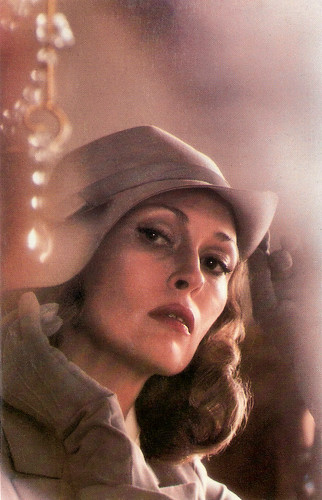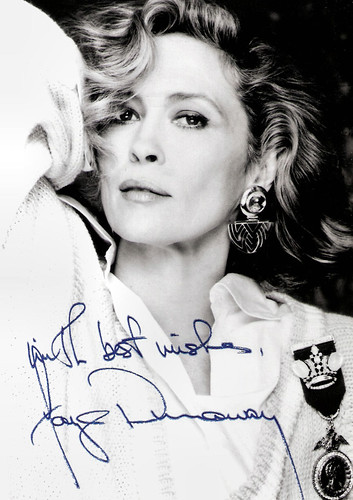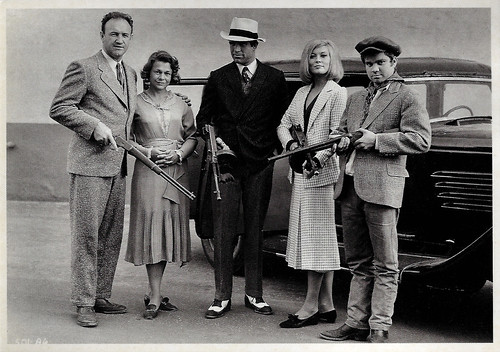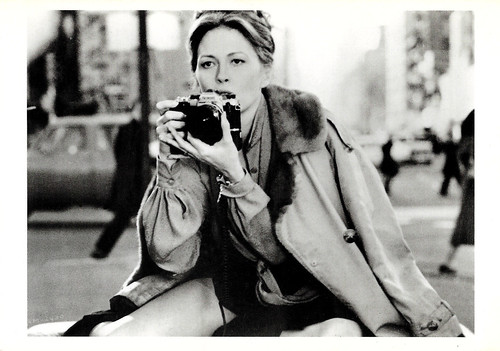American film actress Faye Dunaway (1941) is a classic beauty with high cheekbones and a husky resonant voice. She had her breakthrough as Bonnie Parker in Bonnie and Clyde (1967) and became one of Hollywood's biggest stars of the 1970s with Chinatown (1974), Three Days of the Condor (1975) and Network (1976), for which she won the Oscar. She also played in several European films.

Dutch postcard. Photo: publicity still for Bonnie and Clyde (Arthur Penn, 1967) with Warren Beatty.

British postcard by Star-Graphics, London, no. S 118. Faye Dunaway in Chinatown (Roman Polanski, 1974). Collection: Carla Bosch.

American postcard by Coral-Lee, Rancho Cordova, Ca., Personality #22, 1978. Photo: Douglas Kirkland.

Autograph card.
Dorothy Faye Dunaway was born on a farm in Bascom, Florida in 1941, the daughter of Grace April (Smith), a housewife, and John MacDowell Dunaway, Jr., an army officer. After high school she majored in education at the University of Florida, but switched to theatre arts and transferred to Boston University, earning her degree in 1962.
In 1962, at the age of 21, she took acting classes at the American National Theater and Academy. She did four plays on Broadway over the next three years. Her first screen appearance was on the short-lived TV drama series Seaway (1965). Dunaway's first film appearance was in The Happening (Elliot Silverstein, 1967), which starred Anthony Quinn. That role was followed by a supporting role in the drama Hurry Sundown (Otto Preminger, 1967), co-starring Michael Caine and Jane Fonda. While she had difficulties with Preminger, her performance was well-received and she was nominated for a Golden Globe Award for Best New Star of the Year.
Then she skyrocketed to fame as the bank robber Bonnie Parker in the pop culture juggernaut Bonnie and Clyde (Arthur Penn, 1967), with Warren Beatty. The film, though controversial, was a smash hit, and elevated Dunaway to stardom. For her part, Dunaway earned her first Academy Award nomination. She lost to Katherine Hepburn but won the BAFTA Award for Best Newcomer.
From then on she was in demand everywhere, holding her own against Steve McQueen in the caper film The Thomas Crown Affair (Norman Jewison, 1968). The film was immensely popular and was famed for a scene where Dunaway and McQueen play a chess game and silently engage in heavy seduction of each other across the board.
She then took on a role in the Italian film, Amanti/A Place for Lovers (Vittorio De Sica, 1968). Dunaway played a terminally ill fashion designer who has a doomed romance with an Italian race car driver (Marcello Mastroianni). Dunaway and Mastroianni fell in love in reality too and had a two-year affair.

Dutch postcard. Photo: publicity still for Bonnie and Clyde (Arthur Penn, 1967) with Warren Beatty.

Canadian postcard by Canadian Postcard, no. A-18. Photo: Columbia TriStar. Gene Hackman, Estelle Parsons, Warren Beatty, Faye Dunaway and Michael J. Pollard in Bonnie and Clyde (Arthur Penn, 1967).

French postcard by Editions Hazan, 1996. Photo: Raymond Depardon. Faye Dunaway and Warren Beatty at the premiere of Bonnie and Clyde (Arthur Penn, 1967).

French postcard by Editions La Malibran, Paris / Saint-Dié, no. MC 14. Faye Dunaway in Puzzle of a Downfall Child (Jerry Schatzberg, 1970). The French title was Portait d'une enfant déchue.
Faye Dunaway had another success with the villainous role of Milady de Winter in an all-star adaptation of Alexandre Dumas' The Three Musketeers, starring Michael York, Oliver Reed, Richard Chamberlain, Raquel Welch, and Dunaway. After filming, the makers decided to split the film into two parts: The Three Musketeers (Richard Lester, 1973) and The Four Musketeers (Richard Lester, 1974). Critics and audiences alike praised the film for its action and its comic tone, and it was the first in a line of successful projects for Dunaway.
Roman Polanski offered Dunaway the lead role of Evelyn Mulwray in his mystery Neo-Noir Chinatown (1974). Mulwray is a shadowy femme fatale who knows more than she is willing to let Detective J.J. Gittes (played by Jack Nicholson) know. The film made back its budget almost five times and received 11 Academy Award nominations. Dunaway received a second Best Actress nomination and also received a Golden Globe nomination and a BAFTA nomination.
Dunaway's next project was the all-star disaster epic The Towering Inferno (John Guillermin, 1974). She played the role of Paul Newman's girlfriend, who is trapped in a burning skyscraper along with several other hundred people. The film became the highest-grossing film of the year, further cementing Dunaway as a top actress in Hollywood.
It was also in 1974 that Dunaway married Peter Wolf, who was the lead singer of the rock group The J. Geils Band. In 1975, Dunaway joined Robert Redford in the political thriller Three Days of the Condor (Sydney Pollack, 1975). A significant critical and commercial success, the film continues to be praised. Dunaway's performance was very well regarded.
In 1976 she finally won the Oscar for the satire Network (Sidney Lumet, 1976) as the scheming TV executive Diana Christensen, a ruthless woman who will do anything for higher ratings. She returned to the screen in Eyes of Laura Mars (John Carpenter, 1978), a thriller about a fashion photographer who sees visions of a killer murdering people.

Romanian postcard by Casa Filmului Acin, no. 33132. Photo: publicity still for The Arrangement (Elia Kazan, 1969).

Romanian postcard by Casa Filmului Acin, no. 43 139.

French postcard in the Collection Magie Noire by Editions Hazan, Paris, no. 6250. Photo: Edimedia. Faye Dunaway in Eyes of Laura Mars (John Carpenter, 1978).

Italian postcard by TV Film. Photo: Faye Dunaway as Joan Crawford and Mara Hobel as little Christina Crawford in Mommie Dearest (Frank Perry, 1981).
Faye Dunaway's tour de force as Joan Crawford in Mommie Dearest (Frank Perry, 1981) marked her last chapter as a top-tier actress. The film is an adaptation of Christina Crawford's controversial memoir, Mommie Dearest. Christina Crawford's book depicted her adopted mother as an abusive tyrant, who only adopted her four children to promote her career, and it made quite a stir as the first celebrity tell-all book. Though the film was poorly received by the critics at the time, Dunaway's performance received mixed reviews. The film was later seen as a camp classic. The American Film Institute named Dunaways' interpretation to be one of the greatest villainous characters in cinema history and the infamous line, "No wire hangers, ever!" to be one of the most memorable film quotes of all time.
After a remake of The Wicked Lady (Michael Winner, 1983), Dunaway played another villain in the superhero film, Supergirl (Jeannot Szwarc, 1984). Both films flopped. A late-career highlight came with the critically acclaimed drama Barfly (Barbet Schroeder, 1987), a semi-autobiography of poet/author Charles Bukowski (played by Mickey Rourke) during the time he spent drinking heavily in Los Angeles. From then on she appeared in several independent films. She appeared with Joe Mantegna and Ornella Muti in Wait Until Spring, Bandini (Dominique Deruddere, 1989) and with Robert Duvall and Natasha Richardson in The Handmaid's Tale (Volker Schlöndorff, 1990).
Then followed the sequel to Chinatown (1974), The Two Jakes (1990), directed by and starring Jack Nicholson. The film was not a box office or critical success. She starred alongside Johnny Depp and Jerry Lewis in Serbian director Emir Kusturica's surreal comedy-drama Arizona Dream (1993). Dunaway also appeared with Depp and Marlon Brando in the romantic comedy Don Juan DeMarco (Jeremy Leven, 1995). A hit at the box office, the film was praised for its romance and the performances of the three main characters.
She returned to the stage in 1996, playing famed opera singer Maria Callas in the Tony Award-winning play Master Class by Terrence McNally. Dunaway toured the play throughout the United States. Dunaway was nominated for a Golden Raspberry Award as Worst Supporting Actress for her part in the crime thriller Albino Alligator (Kevin Spacey, 1997) with Matt Dillon. In 1998, she starred with Angelina Jolie in Gia (Michael Christofer, 1998), about the tragic life of model Gia Marie Carangi, which would win Dunaway a third Golden Globe and win Jolie both a Golden Globe and an Emmy.
Faye Dunaway played a small part in the remake of The Thomas Crown Affair (John McTiernan, 1999) with Pierce Brosnan. In 2002, she played Ian Somerhalder's mother in The Rules of Attraction (Roger Avary, 2002), based on the novel by Bret Easton Ellis. She continues to act, mostly in B-films and European films like the campy British horror film Flick (David Howard, 2008) and the Polish thriller Balladyna/The Bait (Dariusz Zawiślak, 2009). After her divorce from Peter Wolf in 1979, Faye Dunaway was married from 1983 to 1987 to British photographer Terry O'Neill. She and O'Neill have one child, Liam O'Neill (1980). In 2003, despite Dunaway's earlier claims that she had given birth to Liam, Terry claimed that Liam was adopted. Over the past years, she starred in such films as The Case for Christ (Jon Gunn, 2017), the thriller The American Connection (Jeff Espanol, 2021) and L'uomo che disegnò Dio/The Man Who Drew God (Franco Nero, 2022), with Kevin Spacey and Franco Nero.

French postcard by Editions La Malibran, Paris, no. MC 29, 1989. Photo: Collection Cinéma Couleur. Mickey Rourke and Faye Dunaway in Barfly (Barbet Schroeder, 1987).

French collectors card in the 'Portrait de Stars - L'encyclopédie du Cinema' series by Edito-Service S.A., 1991. Photo: Koball Collection.

German autograph card by Kino, ca. 1988.
Trailer for Wait Until Spring, Bandini (1989). Source: Ximon NL (YouTube).
Sources: Wikipedia and IMDb.

Dutch postcard. Photo: publicity still for Bonnie and Clyde (Arthur Penn, 1967) with Warren Beatty.

British postcard by Star-Graphics, London, no. S 118. Faye Dunaway in Chinatown (Roman Polanski, 1974). Collection: Carla Bosch.

American postcard by Coral-Lee, Rancho Cordova, Ca., Personality #22, 1978. Photo: Douglas Kirkland.

Autograph card.
Pop culture juggernaut
Dorothy Faye Dunaway was born on a farm in Bascom, Florida in 1941, the daughter of Grace April (Smith), a housewife, and John MacDowell Dunaway, Jr., an army officer. After high school she majored in education at the University of Florida, but switched to theatre arts and transferred to Boston University, earning her degree in 1962.
In 1962, at the age of 21, she took acting classes at the American National Theater and Academy. She did four plays on Broadway over the next three years. Her first screen appearance was on the short-lived TV drama series Seaway (1965). Dunaway's first film appearance was in The Happening (Elliot Silverstein, 1967), which starred Anthony Quinn. That role was followed by a supporting role in the drama Hurry Sundown (Otto Preminger, 1967), co-starring Michael Caine and Jane Fonda. While she had difficulties with Preminger, her performance was well-received and she was nominated for a Golden Globe Award for Best New Star of the Year.
Then she skyrocketed to fame as the bank robber Bonnie Parker in the pop culture juggernaut Bonnie and Clyde (Arthur Penn, 1967), with Warren Beatty. The film, though controversial, was a smash hit, and elevated Dunaway to stardom. For her part, Dunaway earned her first Academy Award nomination. She lost to Katherine Hepburn but won the BAFTA Award for Best Newcomer.
From then on she was in demand everywhere, holding her own against Steve McQueen in the caper film The Thomas Crown Affair (Norman Jewison, 1968). The film was immensely popular and was famed for a scene where Dunaway and McQueen play a chess game and silently engage in heavy seduction of each other across the board.
She then took on a role in the Italian film, Amanti/A Place for Lovers (Vittorio De Sica, 1968). Dunaway played a terminally ill fashion designer who has a doomed romance with an Italian race car driver (Marcello Mastroianni). Dunaway and Mastroianni fell in love in reality too and had a two-year affair.

Dutch postcard. Photo: publicity still for Bonnie and Clyde (Arthur Penn, 1967) with Warren Beatty.

Canadian postcard by Canadian Postcard, no. A-18. Photo: Columbia TriStar. Gene Hackman, Estelle Parsons, Warren Beatty, Faye Dunaway and Michael J. Pollard in Bonnie and Clyde (Arthur Penn, 1967).

French postcard by Editions Hazan, 1996. Photo: Raymond Depardon. Faye Dunaway and Warren Beatty at the premiere of Bonnie and Clyde (Arthur Penn, 1967).

French postcard by Editions La Malibran, Paris / Saint-Dié, no. MC 14. Faye Dunaway in Puzzle of a Downfall Child (Jerry Schatzberg, 1970). The French title was Portait d'une enfant déchue.
A shadowy femme fatale
Faye Dunaway had another success with the villainous role of Milady de Winter in an all-star adaptation of Alexandre Dumas' The Three Musketeers, starring Michael York, Oliver Reed, Richard Chamberlain, Raquel Welch, and Dunaway. After filming, the makers decided to split the film into two parts: The Three Musketeers (Richard Lester, 1973) and The Four Musketeers (Richard Lester, 1974). Critics and audiences alike praised the film for its action and its comic tone, and it was the first in a line of successful projects for Dunaway.
Roman Polanski offered Dunaway the lead role of Evelyn Mulwray in his mystery Neo-Noir Chinatown (1974). Mulwray is a shadowy femme fatale who knows more than she is willing to let Detective J.J. Gittes (played by Jack Nicholson) know. The film made back its budget almost five times and received 11 Academy Award nominations. Dunaway received a second Best Actress nomination and also received a Golden Globe nomination and a BAFTA nomination.
Dunaway's next project was the all-star disaster epic The Towering Inferno (John Guillermin, 1974). She played the role of Paul Newman's girlfriend, who is trapped in a burning skyscraper along with several other hundred people. The film became the highest-grossing film of the year, further cementing Dunaway as a top actress in Hollywood.
It was also in 1974 that Dunaway married Peter Wolf, who was the lead singer of the rock group The J. Geils Band. In 1975, Dunaway joined Robert Redford in the political thriller Three Days of the Condor (Sydney Pollack, 1975). A significant critical and commercial success, the film continues to be praised. Dunaway's performance was very well regarded.
In 1976 she finally won the Oscar for the satire Network (Sidney Lumet, 1976) as the scheming TV executive Diana Christensen, a ruthless woman who will do anything for higher ratings. She returned to the screen in Eyes of Laura Mars (John Carpenter, 1978), a thriller about a fashion photographer who sees visions of a killer murdering people.

Romanian postcard by Casa Filmului Acin, no. 33132. Photo: publicity still for The Arrangement (Elia Kazan, 1969).

Romanian postcard by Casa Filmului Acin, no. 43 139.

French postcard in the Collection Magie Noire by Editions Hazan, Paris, no. 6250. Photo: Edimedia. Faye Dunaway in Eyes of Laura Mars (John Carpenter, 1978).

Italian postcard by TV Film. Photo: Faye Dunaway as Joan Crawford and Mara Hobel as little Christina Crawford in Mommie Dearest (Frank Perry, 1981).
No wire hangers, ever!
Faye Dunaway's tour de force as Joan Crawford in Mommie Dearest (Frank Perry, 1981) marked her last chapter as a top-tier actress. The film is an adaptation of Christina Crawford's controversial memoir, Mommie Dearest. Christina Crawford's book depicted her adopted mother as an abusive tyrant, who only adopted her four children to promote her career, and it made quite a stir as the first celebrity tell-all book. Though the film was poorly received by the critics at the time, Dunaway's performance received mixed reviews. The film was later seen as a camp classic. The American Film Institute named Dunaways' interpretation to be one of the greatest villainous characters in cinema history and the infamous line, "No wire hangers, ever!" to be one of the most memorable film quotes of all time.
After a remake of The Wicked Lady (Michael Winner, 1983), Dunaway played another villain in the superhero film, Supergirl (Jeannot Szwarc, 1984). Both films flopped. A late-career highlight came with the critically acclaimed drama Barfly (Barbet Schroeder, 1987), a semi-autobiography of poet/author Charles Bukowski (played by Mickey Rourke) during the time he spent drinking heavily in Los Angeles. From then on she appeared in several independent films. She appeared with Joe Mantegna and Ornella Muti in Wait Until Spring, Bandini (Dominique Deruddere, 1989) and with Robert Duvall and Natasha Richardson in The Handmaid's Tale (Volker Schlöndorff, 1990).
Then followed the sequel to Chinatown (1974), The Two Jakes (1990), directed by and starring Jack Nicholson. The film was not a box office or critical success. She starred alongside Johnny Depp and Jerry Lewis in Serbian director Emir Kusturica's surreal comedy-drama Arizona Dream (1993). Dunaway also appeared with Depp and Marlon Brando in the romantic comedy Don Juan DeMarco (Jeremy Leven, 1995). A hit at the box office, the film was praised for its romance and the performances of the three main characters.
She returned to the stage in 1996, playing famed opera singer Maria Callas in the Tony Award-winning play Master Class by Terrence McNally. Dunaway toured the play throughout the United States. Dunaway was nominated for a Golden Raspberry Award as Worst Supporting Actress for her part in the crime thriller Albino Alligator (Kevin Spacey, 1997) with Matt Dillon. In 1998, she starred with Angelina Jolie in Gia (Michael Christofer, 1998), about the tragic life of model Gia Marie Carangi, which would win Dunaway a third Golden Globe and win Jolie both a Golden Globe and an Emmy.
Faye Dunaway played a small part in the remake of The Thomas Crown Affair (John McTiernan, 1999) with Pierce Brosnan. In 2002, she played Ian Somerhalder's mother in The Rules of Attraction (Roger Avary, 2002), based on the novel by Bret Easton Ellis. She continues to act, mostly in B-films and European films like the campy British horror film Flick (David Howard, 2008) and the Polish thriller Balladyna/The Bait (Dariusz Zawiślak, 2009). After her divorce from Peter Wolf in 1979, Faye Dunaway was married from 1983 to 1987 to British photographer Terry O'Neill. She and O'Neill have one child, Liam O'Neill (1980). In 2003, despite Dunaway's earlier claims that she had given birth to Liam, Terry claimed that Liam was adopted. Over the past years, she starred in such films as The Case for Christ (Jon Gunn, 2017), the thriller The American Connection (Jeff Espanol, 2021) and L'uomo che disegnò Dio/The Man Who Drew God (Franco Nero, 2022), with Kevin Spacey and Franco Nero.

French postcard by Editions La Malibran, Paris, no. MC 29, 1989. Photo: Collection Cinéma Couleur. Mickey Rourke and Faye Dunaway in Barfly (Barbet Schroeder, 1987).

French collectors card in the 'Portrait de Stars - L'encyclopédie du Cinema' series by Edito-Service S.A., 1991. Photo: Koball Collection.

German autograph card by Kino, ca. 1988.
Trailer for Wait Until Spring, Bandini (1989). Source: Ximon NL (YouTube).
Sources: Wikipedia and IMDb.
Great post. Thanks for the reminder of Dunaway's incredible body of work.
ReplyDeleteThanks, bunchie. She's underrated, despite all the awards.
ReplyDelete